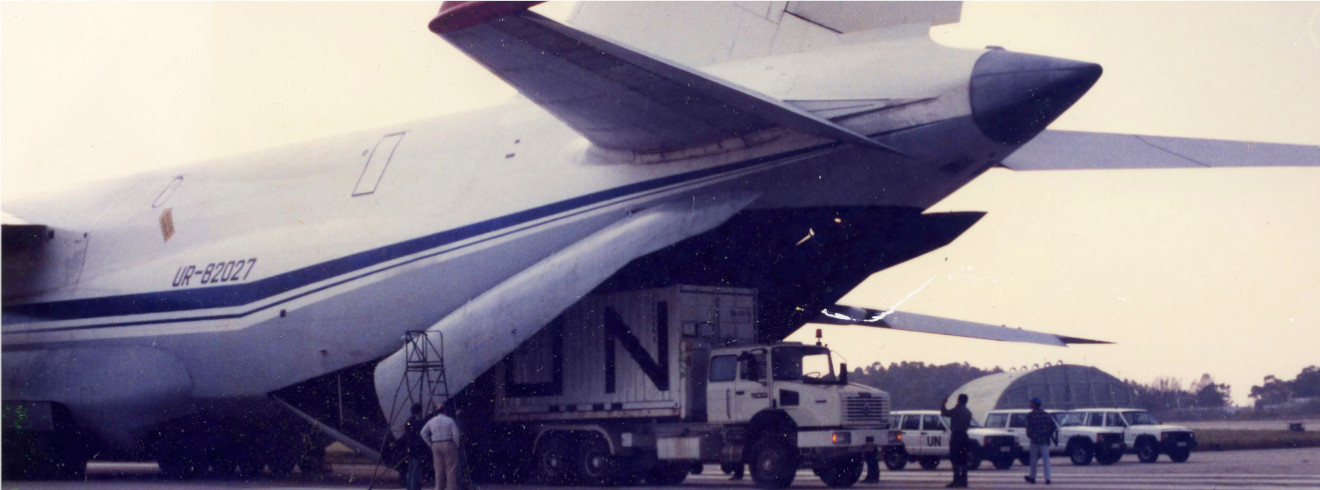
The United Nations Global Service Centre (UNGSC) evolved from a logistics base founded in 1994 to support UN Peacekeeping Operations in the Balkans, to a comprehensive operational hub serving all peace operations worldwide and, under cost recovery arrangements, other UN Secretariat entities, agencies, funds, and programmes, in line with the mandate of the Department of Operational Support.
How UNGSC Came to Be
From 1988 to 1995, twenty additional UN Peacekeeping Missions were established to manage crises and conflict in the Middle East, Central Africa, the Balkans, and the Caucasus.
The increased demand for Missions underscored the need for vast quantities of equipment and assets, robust planning, inventory control and asset management. This spurred the Revolving Reserve Stock - of equipment and assets for starting operations and reusable inventory stored after the closure of Missions. The volumes of stock were far too great for the UN supply depot in Pisa to absorb, and so began the search to find a suitable location where an airfield and harbor were adjacent to each other.
In 1994, a small Southern Italian city of Brindisi was identified as the ideal location, and the first permanent Logistics Base of the United Nations (UNLB) was established.
In 1995, following the liquidation of the Peacekeeping missions UNOSOM II (Somalia) and ONUMOZ (Mozambique), 13 ships loaded with around 3500 vehicles and 3,000 sea containers full of military and other equipment arrived in Brindisi.
The equipment was triaged, some refurbished, some scrapped, some returned to the Member States and some were used to set up the United Nations Logistics Base (UNLB).
In 1998, the Security Council established the United Nations Mission in the Central African Republic (MINURCA) to maintain stability and facilitate free and fair elections. UNLB was by then already an established logistics hub and played a crucial role in the start-up phase of MINURCA. This spurred the genesis of the Mission Support Team concept. Necessary heavy equipment and other essential items for the Mission were transported by the An-124 (Antonov), the largest cargo ship in the world – This aircraft in later years would become one of UNLB’s main assets for Peacekeeping support.
When the Anglo-American Forces made it clear that they were going to attack Iraq, the safety of UN staff and observers UNIKOM (United Nations Iraq-Kuwait Observation Mission) could no longer be guaranteed.
Over a two days span, two airplanes brought to Brindisi 251 UN staff (military and civilian).
Most of them were immediately redeployed elsewhere, while about 50 of them remained in Brindisi, to support the local staff in the organization of the humanitarian response in the after-war.
It was the first time that UNLB served as safe haven for the UN: an Evacuation Team was set up to take care of transport, accommodation and hosting of the colleagues as they landed.
In Brindisi, there was increasing concern for the risk of missile attacks in retaliation, which was further amplified by the presence of military and industrial potential targets.
On 12 January 2010 an earthquake of 7.3 magnitude devastated the capital of Haiti, Port-au-Prince, destroying also the headquarter of the UN mission in Haiti (MINUSTAH).
225.000 people died, 81 of them were UN staff members. The earthquake caused damage for 8 billion USD (CRED data).
UNLB had a prominent role in the humanitarian aid operation that followed:
- On 18 January the first aircraft took off from Brindisi, carrying first aid supplies;
- UNLB staff also supported the relief action, both from UNLB as well as on the ground;
- 12 Standing Police Capacity personnel left from Brindisi for Port-au-Prince to support local authorities after 4.000 inmates had fled the collapsed prisons.
In 2011, the concept of Global Field Support Strategy became a reality. The Under Secretary General of the Department of Field Support, Ms. Susana Malcorra, flew to Brindisi to confirm the rumors that had been circulating, UNLB would be responsible for the procurement functions for Special Political Missions and the management of the Strategic Deployment Stock (SDS) would be moved to Brindisi.
This decision was a turning point for the Base and the city of Brindisi - 100 new staff, international and local were deployed, an international school was being established and the city of Brindisi embraced its new role of hosting an international community and a new UN center. At UNLB changes began as mandates were added to include information and communications technology and geospatial services, administrative support services, supply chain operational management, global asset management and modularization. The UN Logistics Base began its transformation into the Global Service Center of the United Nations.